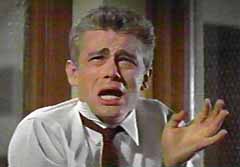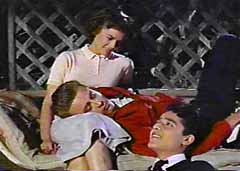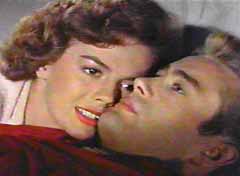
"You're tearing me apart!" Jim (James Dean)
yells at his parents in Rebel Without a Cause.
Rebel Without a Cause, to a certain degree, mirrors my adolescent experiences in a manner much more realistic, much more descriptive (and therefore less prescriptive) than its moral-spewing cousins in educational bulimic edu-dramas or the stylized contortions of Jason Priestlyís eyebrows. First, it presents teen anger as legitimate, as serious. Conventional entertainment handles adolescence and its emotional upheaval as either a phase that is to be grown out of, or a dysfunction that is to be treated carefully with varying 12-step programs. These sentiments are also addressed in Rebel. In the first scene, the cop says to Jim, "You wanna bug us till we have to lock you up!" And later, Judyís mother exclaims, "Itís just the age when nothing fits." But the film continues, challenging both of these hypotheses. Itís obvious that Jim and Judy are not trying to bother their parents, are not just being belligerent, but are reacting naturally to difficult situations. Jim is frustrated with his parents because neither of them seem happy or willing to face their own problems; they are "chicken." Judyís father is rude and abusive, unable to deal with the womanhood of his daughter. We see that even her young brother, in the scene where she returns home after Buzzís death, can mimic appropriate fatherly behavior, while her father cannot. Plato has been abandoned by his parents to a maid, and coupled with his blossoming homosexuality, he is frightened. In addition, two teens die in this movie. There are definite, real problems and no definite, real solutions.

"I'm happy now--here," says Plato (Sal Mineo). "I wish we
could stay here." Plato takes Jim and Judy as his
surrogate parents in Rebel Without a Cause.
Next, Rebel demonstrates that the understanding of adults really doesnít matter. We see in the juvenile hall scene that the chief's understanding, though comforting for a moment, does not make any real difference. Jimís parents might like to understand his anger, but they are too caught up in their own problems to put themselves in his place and take a stand. Judyís mother is always trying to smooth things over for her husband, a father who is incapable of reconciling his worries with the behavior of his daughter. Metaphorically, in the final scene, the adults (police) donít understand the situation--Plato is harmless, scared, and has no bullets--and their misunderstanding kills him. The adults in this film, as in life, do not have real answers for the adolescents, only suggestions that will lead to the youths becoming more manageable.
Third, things seldom work out for the best. Even in the after-school specials where some kid dies a self-destructive death, it is understood that this is only a foil for the virtue of the main character, a lesson for the viewer to learn. Or if some rebel teen is an alcoholic or drug user in a popular TV series or movie, and even if that individual dies or destroys themselves, the rebel youth is done up in the latest fashion, is "so cool," and is emulated by the audience anyway. One need only look to the over-pierced, three-chord-rock-genius suburban spawn that dominate the complaint rock celebration that is MTV, and then to the kids standing on the corner with their ill-fitting clothes and their ill-feeling demeanors to understand that it is the image that is emulated, the image that is the message. But Rebel is content to provide us with Deanís cool image without moral posturing, without a happy ending. Plato dies at the hands of confused adults. Buzz dies because his coat happens to catch in the car, playing a game because theyíve "gotta do something." There is no reconciliation between the teens and their parents, or between their parents and each other. Between the multiple deaths and the misunderstandings there is no happy ending.

"All the time, I've been looking for someone to
love me--and now I love somebody. It's so
easy," says Judy in Rebel Without a Cause.
And perhaps most importantly, Rebel tells us this story and describes for us the lives of these teens without attempting to define their lives as merely a cause/effect relationship. It does not give us solutions, does not provide us with a schemata or a frame of logic whose application will provide us with comfort and security. It was the illogical, senseless nature of life that fueled my rage as a youth speeding around town and screaming, smashing doors. When one first identifies that things in life are painfully wrong, but that, contrary to what one has been taught, there is no logical solution, it is only natural to pummel desks or attack oneís parents or slather oneself with lipstick or carry a gun and run amok or risk oneís life for a game. There is no sense, no plan in life without faith in a pattern. Much of the angst of adolescence is due to the realization that the adults do not so much have faith in a pattern, as they have been exhausted by the frustrations of losing faith. "The problems of man seem trivial and naive indeed, and man, existing alone, seems an episode of little consequence," intones the professor in the planetarium. It is coming to terms with this sentiment that defines the turmoil of adolescence, that is the challenge of adulthood.
Rebel Without a Cause manages an accurate description of the horrors of adolescence. From my youth I learned that things are truly wrong in my life and the world, that the understanding of well-meaning adults makes little difference, that things donít always work out for the best, and that reason and logic are of little use in easing the pain. Unlike the socially responsible narratives of moral pop-psych propaganda, and equally unlike the image brokering of angst-marketers, Rebel refuses to brush off teen years as inconsequential and offers no easy solutions. It avoids the urge to rationalize, is content to merely represent, without judgment, the real or imagined plight of youth as it depicts the impartiality of life. By avoiding the urge to deliver an Aesopís moral or explanation of teen difficulties, Rebel Without a Cause becomes a clear reflection of teen life, a true imitation of life, and therefore true art.
|


 I regard my junior/senior high school experiences with the same wistful pride and reverence I hold for any of my scars. From the garish vision of Mrs. Natzscheís preposterously stenciled eyebrows and the sonorous drone of the cyclic American History films, to the fresh new smell of hair spray and mousse in a fourteen-year-old girlís hair, each day was an exquisite, delicate study of pain. I spent hundreds of days paralyzed in homeroom, cringing in the fluttering fluorescent spotlight, stunned by imagined humiliations, dreading and desperate for attention, worried about what the stinking air blowing from the hot overhead bulbs was doing to my hair. To complicate the pitfalls of my daily life, my parents announced we were moving. For me, and consequently my parents, the line in the sand was drawn.
I regard my junior/senior high school experiences with the same wistful pride and reverence I hold for any of my scars. From the garish vision of Mrs. Natzscheís preposterously stenciled eyebrows and the sonorous drone of the cyclic American History films, to the fresh new smell of hair spray and mousse in a fourteen-year-old girlís hair, each day was an exquisite, delicate study of pain. I spent hundreds of days paralyzed in homeroom, cringing in the fluttering fluorescent spotlight, stunned by imagined humiliations, dreading and desperate for attention, worried about what the stinking air blowing from the hot overhead bulbs was doing to my hair. To complicate the pitfalls of my daily life, my parents announced we were moving. For me, and consequently my parents, the line in the sand was drawn.



